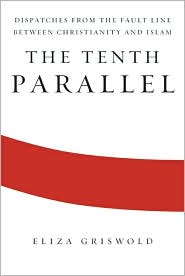 |
| Source of map: Discover magazine |
In The Tenth Parallel: Dispatches from the Fault Line between Christianity and Islam Eliza Griswold, the daughter of an American Episcopal Bishop, writes about her five years reporting in the last decade from the African and Asian frontier between Christian and Muslim societies. During the period she reported from Nigeria, Sudan, Somalia, Indonesia, Malaysia and the Philippines.
The tenth parallel of the title roughly marks the southern boundary of Muslim expansion. Christian evangelists created a chain of missions across Africa as part of the imperial expansion of Western powers, halting the expansion of Islam into Africa. The Western imperial conquest of the Philippines left that island chain divided with Christians in the north and Muslims in the South, until the American occupation in the 20th century began a Christian colonization of previously Muslim areas. Indonesia and Malaysia have Muslim and Christian communities left over from history, as well as ethnic groups that hold neither faith, Griswold describes these facts of life on or near the tenth parallel in order to enable the reader to understand the historical context of the present from which she reports.
 People are poor in the places Griswold visited. In many places, their poverty is exacerbated by environmental degradation. They are marginalized from political as well as economic power. Frequently they are tribal. Often barely noticed by the outside world, they fight and kill each other (and die in large numbers from hunger and disease). Griswold describes place after place in which atrocities have taken place in these distant communities. In some cases Muslims kill Christians and in others Christians kill Muslims.
People are poor in the places Griswold visited. In many places, their poverty is exacerbated by environmental degradation. They are marginalized from political as well as economic power. Frequently they are tribal. Often barely noticed by the outside world, they fight and kill each other (and die in large numbers from hunger and disease). Griswold describes place after place in which atrocities have taken place in these distant communities. In some cases Muslims kill Christians and in others Christians kill Muslims.Griswold describes competition for believers between Christian evangelical missions and Muslims equally focused on converting others to their faith. Both Christians and Muslims seek to retain the members of their faith against conversion to the other faith.
While the Christian-Muslim fault line is the most visible and important, the Muslims are fractionated into competing factions as are the Christians. Christian missionaries in large numbers go forth from the United States and South Korea (countries that are rich enough to support foreign missions) and as Griswold points out U.S. foreign policy supported faith-based people and programs, explicitly during the Bush administration. Money flows from the oil rich Gulf states to support Muslim causes.
Perhaps I misread Griswold, but I think she implies in the book that often the fighting is fueled by competition for power and wealth. Certainly this seems to be the case in oil rich areas in Sudan and the Philippines from which she was reporting. In other cases, people are being forced from their traditional homes by environmental degradation and fight with the current residents in the areas to which they are moving.
I came away from the book with a strong feeling that few of the people that Griswold interviewed had any deep understanding of their faith. While some of those working to convert others to their religion had studied the texts and theology of those religions, many seemed not to have a clue. The faith of many of the "converts" was like that of the peasants who were deemed converted when their master was converted; for others the faith seemed to be childlike belief than public acceptance of a label would guarantee admittance to paradise; still others seemed to join a religion as they would become fans of a sports club. Still, their faith gave many comfort as they faced very difficult lives.
 |
| Eliza Griswold |
I think most Americans would learn something important about the "clash of cultures" from reading this book with its depiction of real problems of poor people in Africa and South-East Asia. However, the book has scenes that should shock almost all readers. Those who strongly support evangelical efforts of either Christians or Muslims may find the book so dissonant with their preconceptions as to be rejected out of hand. Still, since the book is well organized and well written, most will read it through and benefit from it.
Here are a couple of reviews of the book:
No comments:
Post a Comment